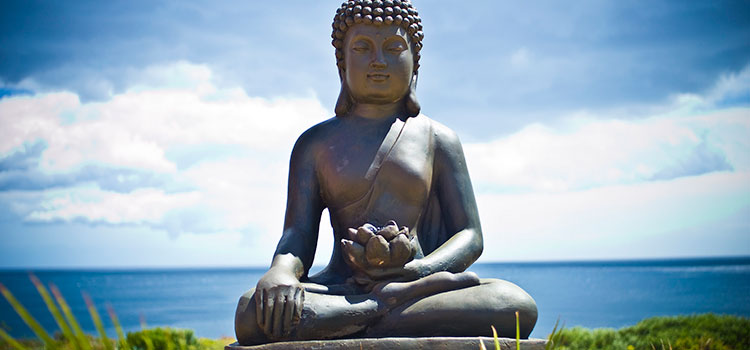It may be no coincidence that the rise of the compassionate healthcare movement roughly corresponds to a rise in the popularity of Buddhism in this country. After all, Buddhism is a practice of compassion, and the vast majority of its practitioners are naturally going to be in support of anything that is healing and compassionate for truly sick patients.
While the cannabis community has embraced and incorporated Buddhism, at least in terms of branding, many Buddhists admit to an ambivalent relationship with marijuana. You’re not likely to catch the whiff of pot at a monastery or find people vaping before a Zen meditation. They just don’t go hand in hand. One Buddhist writer in an article for Lion’s Roar felt so stigmatized and ashamed for using cannabis that he/she resorted to an anonymous byline in an article about quitting pot.
The fifth Buddhist precept takes a clear stand on avoiding intoxicants, but just what constitutes an intoxicant can be contested.
In a LinkedIn debate about cannabis and Buddha branding Dr. Emily Earlenbaugh, co-founder and patient consultant at Mindful Cannabis Consulting says, “Cannabis is not an intoxicant, although it can be mind-altering. And it wasn’t considered an intoxicant at the time of the Buddha, so it’s hard to lump it into that category. It has really only been conceived of as an intoxicant since the passage of anti-marijuana laws, which were created for political, rather than scientific reasons. In fact it has many documented healing properties.”
Within the Buddhist community anger, delusion or attachment may be considered no less destructive intoxicants than drugs or alcohol.
Most Buddhists don’t make judgments about recreational marijuana use, but they probably wouldn’t encourage it either. Unless sick, pot is usually seen as an obstacle to a clear mind, one of the objectives of meditation for those who practice it.
This brings up some interesting questions of ethics when using Buddha to brand bud.
Earlenbaugh says, “If you were using cannabis, instead of meditation, or in order to achieve a meditative state, that would be ill-advised on the Buddhist path. If you are using it as a medical intervention for some condition, that seems perfectly in keeping with compassionate treatment of your body.”
Some cannabis enthusiasts defend the blending of recreational bud and Buddha by citing legends about Shiva and other Vedic Hindu traditions as support. But while Buddhism may have evolved from Hinduism, there are distinct differences between the two.
Whether or not to use cannabis as a meditation tool is a personal choice. Many feel it has enhanced their practice and entire religious communities have sprung up around its use. Marijuana and meditation have a complex relationship with strong opinions both for and against its benefits.
But out of respect for an ancient religion that generally doesn’t embrace getting high, perhaps a little thought might be put into how one incorporates Buddhist terminology into branding pot products. A consulting business with the objective of helping patients make informed and mindful decisions about their healthcare gives one message. Buddha Bud probably gives another.
Photo Credit: neonow
Get daily cannabis business news updates. Subscribe
End
